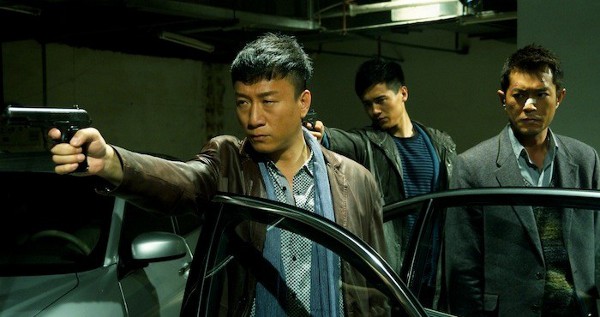
Directed by Johnnie To
Written by Ryker Chan, Ka-Fai Wai, Nai-Hoi Yau, Xi Yu
China/Hong Kong, 2012
Drug War begins on an impromptu note: a man foaming at the mouth and barely in control of his vehicle thunderously crashes into a local restaurant after fleeing from a drug house. This is followed by a highway sting where a few low level drug traffickers are caught; one man exchanges furious obscenities with his police captor, which are immediately closed off with a response of “I didn’t betray you; I busted you.” Drug War succeeds in never backing off this initial thrust and heightened interplay. The story of cops and criminals predates most, but master director Johnnie To’s latest plays out like an innovative trailblazer and modern spectacle all at once.
Equipped with a hardened zeal and a swift set of genre kinetics, Drug War is close to perfect: a lean and airtight spiraling saga of bullets, busts, and betrayals. While it would be apt to characterize To’s structurally dense and assured crime picture as another run-of-the-mill actioner, fear not, as To essentially takes a torpedo to said characterization by way of seamless formal and narrative control.
Taking place over the span of a couple frantic days in China, Drug War possesses a wide scope, one made all the more impressive with To’s measured sleight of hand. Almost unspooling like an epic season of television feverishly compacted down to two hours, the many faces and identities found in this crime-laden world can largely be whittled down to two: wily drug cartel boss Timmy Choi (Louis Koo) and cool and calm anti-drug police captain Zhang Lei (Honglei Sun), a pair ostensibly caught up in a chaotic undercover operation to bring down some notable upper-level traffickers.
Sounds awfully familiar, right? To gracefully masks the familiar narrative trappings with a nervy sense of movement and inevitability as the fates of those on opposite sides of the law feel linked and interchangeable via role reversal and undercover masking. Consciously grouped together as one entity, the relationship between Timmy and Zhang is appropriately tailored to fit the film’s wired flow: we’re essentially mainlining seasoned stock themes of honor and code, all routinely understood and lit with a harsh blue palette.
To stacks taut sequence on top of one another throughout the film: effortless crosscutting carves through the hierarchy of officers and criminals, depicting a relentless connected world of showdowns and shootouts. Poker-faced, brooding, and often hilarious, Drug War emotes moody warfare with shards of brazen operatic immediacy; mists of blood flair up as the narrative stakes increase with rapid intensity. For the players involved, there’s no escape route. Information breeds further turmoil and disorder. A sting or operation is only followed by more procedure. A scene we’ve seen a thousand times before pops up roughly thirty minutes into the film and dazzles: Zhang must portray Chang, a steely mid-level cog in the drug trade to a zany higher-up named Haha; this is then reversed a few scenes later: Zhang is now acting as Haha to the real Chang. This roughly fifteen minute sequence is a true showstopper and an integral piece of Drug War’s center of unrest. As Drug War begins and ends with the same character, so does the sense of unnerving beauty and craftsmanship put forth by To and company. Here, the wheel feels reinvented in some way. Blood is blood and the law is the law. It’s all played out on a grand scale until the lights go out. Drug War is breathtaking in all the best ways – a product that isn’t fully aware of how cool it is – hard boiled cinema on fire.
— Ty Landis



